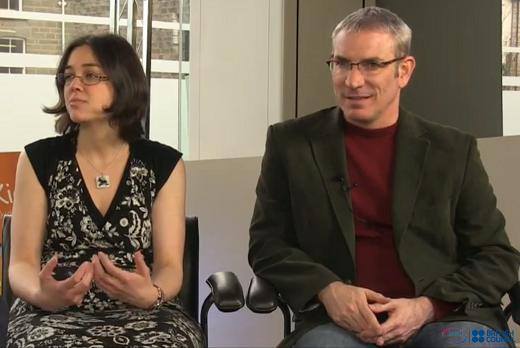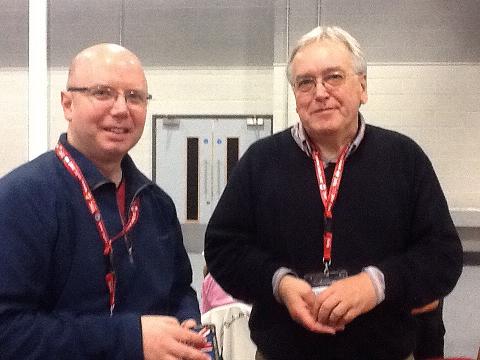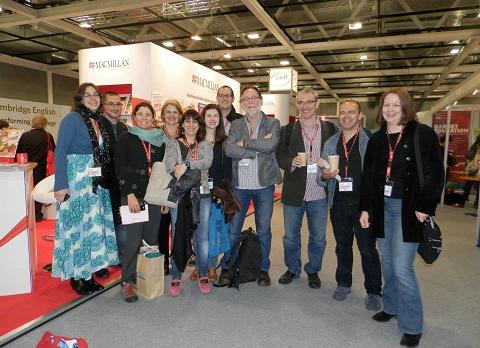 Reflections on the 48th IATEFL Conference: Harrogate, 2014
Reflections on the 48th IATEFL Conference: Harrogate, 2014
by Adam J. Simpson
For the third time in the last ten years the IATEFL annual conference was held in the beautiful former spa town of Harrogate in northern England and this year, with additional session rooms and a larger exhibition hall, the event was bigger and better than ever. In addition to an impressive array of plenary speakers including David Graddol, Kathleen Graves, Michael Hoey, Sugata Mitra and Jackie Kay, the School of Languages was represented as always, this year by Jonathan Smith and Adam Simpson.
New to this year’s event were several innovative features. These included an opportunity to ‘Meet the Patron’, Professor David Crystal, and an Open Space event facilitated by Adrian Underhill. It also included an exciting new session format called ‘ELT Conversation’, involving discussion between two leading ELT professionals, Jeremy Harmer and Scott Thornbury, followed by questions from the floor. In addition to this, there were over 500 sessions including Signature events, talks, workshops, forums, symposiums, poster presentations and early morning ‘How to …’ talks to choose from as well as the IATEFL Jobs Market and the exhibition featuring over 50 exhibitors and packed with all the latest ELT books, products, services and resources. Despite the enormity of this year’s event, the annual conference maintained its well-known friendly and relaxed atmosphere, where ELT professionals from around 100 countries were able to network, discuss and socialize.
The School of Languages at IATEFL 2014
 Jonathan Smith was one-third of the Turkish university triumvirate that delivered the session ‘FOCI: an inter-institutional network for building a professional learning community’ alongside Funda Akgul Zazaoglu (Izmir University of Economics), and William Kerr (Koç University, Istanbul). Their presentation traced the development of the Forum on Curricular Issues (FOCI), established in Istanbul in 2010. Developed for curriculum team members of any tertiary institution, FOCI holds biannual two-day sessions at various Turkish/North Cyprus universities. The presentation described FOCI's creation and development, the challenges encountered, and individual and institutional benefits provided.
Jonathan Smith was one-third of the Turkish university triumvirate that delivered the session ‘FOCI: an inter-institutional network for building a professional learning community’ alongside Funda Akgul Zazaoglu (Izmir University of Economics), and William Kerr (Koç University, Istanbul). Their presentation traced the development of the Forum on Curricular Issues (FOCI), established in Istanbul in 2010. Developed for curriculum team members of any tertiary institution, FOCI holds biannual two-day sessions at various Turkish/North Cyprus universities. The presentation described FOCI's creation and development, the challenges encountered, and individual and institutional benefits provided.
Adam Simpson’s talk was entitled ‘How we made an ‘‘English for Maths and Science’’ course.’ Traditional coursebooks, Adam noted, often favour social sciences over natural sciences. Seeking to redress the balance, this presentation offered a set of ‘guiding principles’ to those wishing to implement an ESP program. Specifically, this presentation explored the process of identifying course needs, choosing materials, formulating objectives, and giving consideration to the roles of classroom teachers, assessment and feedback.
The plenary speakers
David Graddol, director of The English Company (UK) Ltd, which provides consultancy and publishing services in applied linguistics, delivered the opening plenary ‘English and economic development.’ In this talk Graddol critically explored the idea that English brings economic benefits. He posed these questions: Is the economic rationale just disguising a new kind of linguistic imperialism? Or does it genuinely bring benefits to those investing in English? In this presentation Graddol critically explored the role English now plays in different sectors of the economy, especially the growing services economy, and the implications of this for educational policy. Using the Common European Framework of Reference (CEFR) to identify functional proficiency levels, he discussed some recent global educational and employment trends. Drawing on his own recent work in India, China and Brazil Graddol explored some of the shared issues that have arisen with regard to English language education in these emergent economies, as well as some of the key differences. Finally, he addressed what considers to be a key issue: does the economic rationalist argument for the massive push for English teaching around the world really make sense? Is it delivering the supposed economic benefits? And what are the potential social, cultural and other costs?
Kathleen Graves, associate professor of Education Practice at the University of Michigan, delivered the plenary ‘The efficiency of inefficiency: an ecological perspective on curriculum.’ Efficiency, Graves suggested, is the ability to do or produce something without wasting materials, time or energy. In a curriculum driven by efficiency, the aim is to get learners to learn as much as possible in as little time as possible with the fewest resources necessary. In ELT, the global role of English has made efficient delivery of English instruction a major concern of ministries of education, educational institutions and schools. This demand creates tremendous pressures on teachers and students to produce results quickly in the classroom. Unfortunately however, many educational efforts aimed at efficiency in classrooms often do not lead to the intended outcomes. So, teachers are caught between needing to use time and resources efficiently and acknowledging that learning a language is a process that takes time. In contrast, an ecological perspective on curriculum focuses on growth and development. These processes evolve through the interplay among learners, teacher, subject matter and the learning environment. Learning must take root and be nurtured, stated Graves; and teachers must focus on who the learners are, not only what they must learn. All of which takes time, and seems to be at odds with efficiency. Or is it? In the end, an approach to learning that seems inefficient may actually be efficient in terms of meeting educational goals in lasting ways. In this talk, Graves looked at the ecology of one specific classroom and how a seemingly inefficient approach to teaching of language leads to learning outcomes that appear to be deeply embedded in students’ lives and experience. She also explored the implications of these ideas for teachers, teacher educators, and curriculum designers.
Michael Hoey, Baines Professor of English Language at the University of Liverpool, delivered the third of what was generally an excellent series of plenary talks, this one entitled ‘Old approaches, new perspectives: the implications of a corpus linguistic theory for learning the English language.’ Two major figures in English Language Teaching are Michael Lewis and Stephen Krashen, but both have come under heavy criticism. Hoey briefly described the major claims of both as well as outlining some of the criticisms that have been leveled against them. He then sought to demonstrate that their claims are compatible with current corpus-linguistic research, which is itself supported by long-standing and robust psychological research. What corpus-linguistic and psychological studies in fact suggest is that we need a very different model of the way language is organised; Lexical Priming theory is an attempt to provide such a model of language. Hoey then described the main claims of the theory and provided evidence for these claims. Finally, his talk offered provisional evidence to support the view that Chinese has the same lexical properties as English. This is important because it suggests that Hoey’s own work and that of Lewis and Krashen are as likely to be relevant to the learning and teaching of Chinese as they are to English. Perhaps more importantly, it also suggested that two apparently very different languages like Chinese and English are more alike in major ways than is usually assumed; this has important implications for the teaching of English, some of which were discussed.
The fourth plenary was delivered by Sugata Mitra, professor of Educational Technology at the School of Education, Communication and Language Sciences at Newcastle University. In his controversial talk, ‘The future of learning,’ Mitra took us through the origins of schooling as we know it, to the dematerialization of institutions as we know them. Thirteen years of experiments in children's education, he suggested, had taken us through a series of startling results – children can self-organise their own learning, they can achieve educational objectives on their own, they can read by themselves. Finally, the most startling of them all: groups of children with access to the internet can learn anything by themselves. From the slums of India, to the villages of India and Cambodia, to poor schools in Chile, Argentina, Uruguay, the USA and Italy, to the schools of Gateshead and the rich international schools of Washington and Hong Kong, Mitra's experimental results showed a strange new future for learning.
The final plenary of the conference, ‘The imagined land,’ was delivered by the award winning writer Jackie Kay. She read from her memoir Red Dust Road, while talking about imagined lands in her work; not just the red dust road of her ancestral village, but the original countries of people who have been exiled. Kay read new poems based on the voices of three different Scottish refugees, and talked about the various creative ways that people, in a new country, recreate their original one. The Imagined Land is rich and fertile; it is lost and found. The life you didn’t live often runs alongside, or even underneath the life you actually did live. Through a mixture of poetry and prose, Kay explored these rich themes, reopening the free border country of the imagination.
IATEFL Online interview with Adam Simpson
The School of Languages’ Adam Simpson, along with Sandy Millin, was interviewed by Paul Braddock and Ann Foreman of the British council at the conference for IATEFL Online. Adam and Sandy were asked about the ingredients for a successful blog and the inspirations behind their blogs. Please click here to watch the video.
 Personal highlights from sessions attended by Adam Simpson
Personal highlights from sessions attended by Adam Simpson
In Kieran Donaghy’s wonderfully practical session ‘Moving words: using moving images to help students learn vocabulary,’ we looked at a range of classroom activities, showing how short films, film clips and videos can help students understand, learn and remember vocabulary. These activities have all been tried and tested by Kieran. Participants got a number of ideas for teaching vocabulary through moving images to take away and use with their own students.
In their informative presentation, ‘Teaching English: developing the global home for teachers’, Paul Braddock and Ann Foreman looked at the British Council's global website for teachers and the many changes made on the site in the last 12 months. We will explore the rationale for several new resources aimed at teachers of primary and secondary education, as well as a range of teacher tools and professional development possibilities.
The excellent talk ‘Box-ticking or mind-mapping? Questions about ELT professional knowledge’ was presented by Divya Madhavan and Willy Cardoso. This session explored their shared concern for the box-ticking culture within teacher training and development, and the impact it has on validating professional knowledge. To propose an alternative, they recovered ideas from different strands of education, outlining a philosophical and pedagogical standpoint from which practitioners can become the principal authors of professional knowledge.
In her session Merve Oflaz gave us ‘21 tips to be a 21st Century teacher.’ As teachers, Merve stated, we are trying to encourage our students to develop 21st Century skills. What about ourselves? She posed the question: how can we, as teachers, achieve to think critically and communicate and collaborate more effectively? This session provided us with some tips to be more efficient 21st Century teachers. It also demonstrated some student-centred activities which incorporate fun into our classrooms.
Işıl Boy delivered the excellent talk entitled ‘The use of mobile technologies in education - mind the gap.’ In her extremely informative session, she outlined the findings of a case study research which examined teachers’ use of mobile technologies in seven EFL classrooms. As participants, we gained insight into how we can use mobile technologies in teaching, and were provided with a list of educational apps that proved to be useful for the research participants.
The talk ‘Deconstructing video’ was given by the marvelous Jamie Keddie. Video, he suggested, is a multi-modal medium - a dynamic interplay of audio and images which come together to co-construct meaning. In this workshop, we examined the anatomy of a video and consider ways of maximizing student interaction with its constituent components. Some ideas were taken from Keddie’s new OUP title, ‘Bringing Online Video into the Classroom.’
Rosie Tanner’s session was entitled ‘BLISSfully developing basic teacher education materials.’ Trainers and teachers in Bihar (north-east India) often work in hot rural schools with large classes and minimal resources. In the BLISS (Bihar Language Initiative in Secondary Schools) project, Tanner is supporting a team of Indian trainer-writers in developing teacher education and train-the-trainer materials. She talked about their pilot and the delights and lessons they are learning.
Private language schools often send their learners out to interview people in the streets, but could these learners get more out of this activity? In the fascinating talk ‘Bridging the gap between learning materials and an English-speaking environment,’ Lizzie Pinard explored how task-based learning and an intercultural approach can be combined to develop materials that enable learners to benefit more fully from a potentially rich learning opportunity and develop their intercultural communication skills.
“I’ve studied English for years, but I can’t understand anyone!” This was a common complaint from students on arrival in the UK, noted Sandy Millin in ‘Stepping into the real world: transitioning listening.’ This wonderful workshop introduced participants to practical activities and materials we can use to help students transition from understanding scripted listening materials to feeling comfortable with real-world English.
Cecilia Lemos’ great presentation was entitled ‘Making lesson observation a teacher’s best friend, not the enemy.’ There's a general consensus on the many benefits of observation. It is well known and discussed in training sessions, books and forums. So why are many teachers still resistant or threatened by it? In this session, I will share a program and forms developed after research, trial and error, trying to overcome resistance and make observation truly effective for teacher development.
To mark 20 years at the ‘chalkface’, Hugh Dellar’s excellent talk, ‘Twenty things in twenty years: this much I know,’ attempted the limited wisdom he has accumulated. Covering everything from why how we're taught to teach grammar is bad for us to the danger of learning styles, from the similarities between NLP and Ponzi schemes to the true purpose of teaching pronunciation, Dellar engaged and enraged his audience in equal measure.
For many years we looked at mentoring as something an older, experienced teacher does to initiate new, inexperienced colleagues. In their session, ‘Be a great teacher - become a mentor,’ Tamas Lorincz and Roseli Serra, attempted to extend this definition and suggest that every teacher, at some stage, should become a mentor in order to test their beliefs about effective teaching and gain better insight into their own professional activities.
